9 start with B start with B

Scientific advances and economic forces have converged to create something unthinkable for much of human history: a robust market in human body products. Every year, countless Americans supply blood, sperm, and breast milk to “banks” that store these products for later use by strangers in routine medical procedures. These exchanges entail complicated questions. Which body products are donated and which sold? Who gives and who receives? And, in the end, who profits? In this eye-opening study, Kara Swanson traces the history of body banks from the nineteenth-century experiments that discovered therapeutic uses for body products to twenty-first-century websites that facilitate a thriving global exchange.
More than a metaphor, the “bank” has shaped ongoing controversies over body products as either marketable commodities or gifts donated to help others. A physician, Dr. Bernard Fantus, proposed a “bank” in 1937 to make blood available to all patients. Yet the bank metaphor labeled blood as something to be commercially bought and sold, not communally shared. As blood banks became a fixture of medicine after World War II, American doctors made them a front line in their war against socialized medicine. The profit-making connotations of the “bank” reinforced a market-based understanding of supply and distribution, with unexpected consequences for all body products, from human eggs to kidneys.
Ultimately, the bank metaphor straitjacketed legal codes and reinforced inequalities in medical care. By exploring its past, Banking on the Body charts the path to a more efficient and less exploitative distribution of the human body’s life-giving potential.

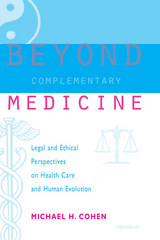
Integration of divergent philosophies, paradigms, and practices requires responsible investigation, informed judgment, and open-minded yet critical study and analysis of various systems of healing. Michael H. Cohen offers providers and policymakers vitally important information by addressing questions such as credentialing, malpractice, informed consent, and liability for referrals. He describes both practical strategies for minimizing liability, as well as the necessary future evolution of the legal and regulatory structure.
Cohen also probes uncharted ethical and bioethical issues in complementary medicine and integrative health care. He further explores the connection between law, medicine, and spirituality and the role of this connection in human evolution. The book's range mirrors the integrative process itself, a process of grappling with, and meaningfully assimilating, disparate traditions and unfamiliar ways of thinking about the significance of health, body, and being.
Beyond Complementary Medicine is required reading for anyone involved in health care, including executives, insurers, managed care organizations, attorneys, ethicists, and lawmakers; physicians integrating complementary and alternative therapies; complementary and alternative medicine practitioners; medical schools, law schools, and educational institutions offering programs in health care, public health, and complementary therapies; companies manufacturing herbs and dietary supplements; and most of all, patients and their families.
Michael H. Cohen is President of the Institute for Integrative and Energy Medicine, a nonprofit organization in health care policy, ethics, and legal and regulatory affairs, and an attorney with an international practice in integrative health care.
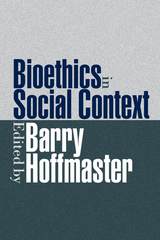
The original essays in this volume use qualitative research methods to expose the multiple contexts within which the problems of bioethics arise, are defined and debated, and ultimately resolved. In a provocative concluding essay, one contributor asks his fellow ethnographers to reflect on the ethical problems of ethnography.

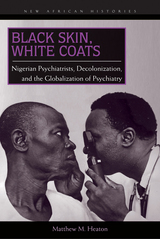
Black Skin, White Coats is a history of psychiatry in Nigeria from the 1950s to the 1980s. Working in the contexts of decolonization and anticolonial nationalism, Nigerian psychiatrists sought to replace racist colonial psychiatric theories about the psychological inferiority of Africans with a universal and egalitarian model focusing on broad psychological similarities across cultural and racial boundaries. Particular emphasis is placed on Dr. T. Adeoye Lambo, the first indigenous Nigerian to earn a specialty degree in psychiatry in the United Kingdom in 1954. Lambo returned to Nigeria to become the medical superintendent of the newly founded Aro Mental Hospital in Abeokuta, Nigeria’s first “modern” mental hospital. At Aro, Lambo began to revolutionize psychiatric research and clinical practice in Nigeria, working to integrate “modern” western medical theory and technologies with “traditional” cultural understandings of mental illness. Lambo’s research focused on deracializing psychiatric thinking and redefining mental illness in terms of a model of universal human similarities that crossed racial and cultural divides.
Black Skin, White Coats is the first work to focus primarily on black Africans as producers of psychiatric knowledge and as definers of mental illness in their own right. By examining the ways that Nigerian psychiatrists worked to integrate their psychiatric training with their indigenous backgrounds and cultural and civic nationalisms, Black Skin, White Coats provides a foil to Frantz Fanon’s widely publicized reactionary articulations of the relationship between colonialism and psychiatry. Black Skin, White Coats is also on the cutting edge of histories of psychiatry that are increasingly drawing connections between local and national developments in late-colonial and postcolonial settings and international scientific networks. Heaton argues that Nigerian psychiatrists were intimately aware of the need to engage in international discourses as part and parcel of the transformation of psychiatry at home.
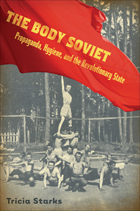
Health, though essential to the revolutionary vision and crucial to Soviet plans for utopia, has been neglected by traditional histories caught up in Cold War debates. The Body Soviet recovers this significant aspect of Soviet thought by providing a cross-disciplinary, comparative history of Soviet health programs that draws upon rich sources of health care propaganda, including posters, plays, museum displays, films, and mock trials. The analysis of propaganda makes The Body Soviet more than an institutional history; it is also an insightful critique of the ideologies of the body fabricated by health organizations.
"A masterpiece that will thoroughly fascinate and delight readers. Starks's understanding of propaganda and hygiene in the early Soviet state is second to none. She tells the stories of Soviet efforts in this field with tremendous insight and ingenuity, providing a rich picture of Soviet life as it was actually lived."— Elizabeth Wood, author of From Baba to Comrade: Gender and Politics in Revolutionary Russia

Neural grafting, virtual reality, gene therapy, psychotropic drugs As startling new treatments emerge for disorders of the brain, new concerns are arising along with them. In the first book to examine the implications of the full range of revolutionary interventions now possible in the human brain, Robert H. Blank warns that while these new techniques may promise medical wonders, they also raise profound political questions.
Our rapidly unfolding knowledge about the brain and the accompanying applications have three main policy dimensions: funding research initiatives, controlling individual use, and assessing social consequences. But underlying these aspects, Blank argues, are more disturbing issues that pose fundamental challenges to our conceptions of equality, autonomy, freedom, responsibility, and human nature itself.
Brain Policy makes the key facts from the technical literature readily accessible to social scientists and general readers and points out the implications for our society. Blank first explains the structure and function of the nervous system and current theories of brain operation; he then assesses the uses and potential abuses of various intervention techniques. He identifies the public policy issues raised by discoveries in the neurosciences and calls for intensified scrutiny of the advantages and disadvantages of new technologies.
Warning that the risks and dangers of the dramatic developments in neuroscience are potentially large, Blank offers a means of understanding these scientific advances and the philosophical and political issues they entail. This book will be of interest to social scientists, policy analysts, policy makers, bioethicists, scientists who want to see the bigger picture, and the informed reader with an interest in the implications of neuroscience for themselves and society.
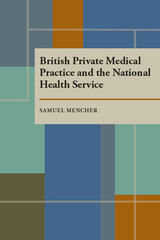
Samuel Mencher spent a year in Great Britain (1965-1966) interviewing leaders of professional medical associations, executives of the health insurance societies, and general practitioners and specialists engaged in private practice. His study of the private medical service twenty years after the passage of the National Health Service Act reviews the changes, problems, and successes of the National Health Service: trends in the amount and types of private medicine, the issues of conflict between private medicine and public policy, and attitudes of the public and of medical professionals.
READERS
Browse our collection.
PUBLISHERS
See BiblioVault's publisher services.
STUDENT SERVICES
Files for college accessibility offices.
UChicago Accessibility Resources
home | accessibility | search | about | contact us
BiblioVault ® 2001 - 2024
The University of Chicago Press









